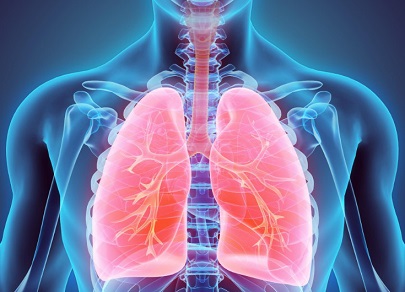44.4 Percent Of Indians Exposed To SARS-CoV-2 Suffer From Post COVID Lung Damage!
Nikhil Prasad Fact checked by:Thailand Medical News Team Feb 20, 2024 1 year, 11 months, 1 week, 2 days, 9 hours, 24 minutes ago
COVID-19 News: The aftermath of the COVID-19 pandemic continues to unveil significant health challenges, with a recent study conducted by Christian Medical College, Vellore, shedding light on the lasting effects of SARS-CoV-2 on the Indian population. This study covered in this
COVID-19 News report, considered the largest of its kind in India, investigates the post-COVID lung damage experienced by individuals who have recovered from the virus.
 44.4 Percent Of Indians Exposed To SARS-CoV-2 Suffer From Post COVID Lung Damage
Study Overview
44.4 Percent Of Indians Exposed To SARS-CoV-2 Suffer From Post COVID Lung Damage
Study Overview
The study examined 207 individuals during the first wave of the pandemic, assessing lung function impairment and lingering symptoms in those who had mild, moderate, and severe COVID-19. The research revealed that a substantial 44.4% of Indians exposed to SARS-CoV-2 suffered from post-COVID lung damage, surpassing the impact observed in European and Chinese populations.
Key Findings
The most alarming revelation from the study was the impairment in the gas transfer (DLCO), a critical lung function test measuring the ability to transfer oxygen from the air to the bloodstream. A staggering 44% of individuals exhibited reduced DLCO, indicating a worrisome trend. Additionally, 35% showed signs of a restrictive lung defect, affecting the lung's ability to inflate with air during breathing, and 8.3% had an obstructive lung defect, impacting the ease of air movement in and out of the lungs.
Comparisons with Other Populations
Contrary to expectations, Indians fared worse in all aspects of the study when compared to Europeans and Chinese populations. The principal investigator of the study, Dr. D J Christopher, highlighted that more Indian subjects had comorbidities such as diabetes and hypertension, potentially contributing to the increased severity of post-COVID lung damage.
Long-term Impact on Lung Function
The study, conducted an average of 63 days after the onset of symptoms, utilized comprehensive assessments, including complete lung function tests, six-minute walk tests, blood tests, and quality of life evaluations. The findings revealed that while some individuals may experience a gradual return to normalcy over up to one year, others may have to live with permanent lung damage.
Expert Perspectives
Dr Salil Bendre, head of pulmonology at Nanavati Hospital, emphasized that approximately 4-5% of individuals who experienced moderate to severe COVID-19, requiring hospitalization, oxygen support, and steroid treatment, may face permanent lung impairment.
He noted that post-infection lung fibrosis could affect approximately 95% of patients who have been exposed to the SARS-CoV-2 virus!
In-Depth Analysis of Post-COVID Lung Damage
The study also delved into the impact of post-COVID lung damage on pulmonary function, exercise tolerance, and quality of life. Key parameters, incl
uding clinical symptoms, pulmonary function test results, six-minute walk test outcomes, St George’s Respiratory questionnaire (SGRQ) scores, and chest radiographs, were meticulously analyzed.
Demographic and Comorbidity Analysis
The study included 207 subjects with a mean age of 48.7 years, with 68.1% being male. The 'COVID-19 pneumonia' group, representing moderate to severe cases, exhibited higher comorbidities, with diabetes being significantly more prevalent (49.4% vs. 29.8%). Overall, 72.5% of the subjects had underlying comorbidities, emphasizing the importance of considering pre-existing health conditions in the evaluation of post-COVID lung damage.
Pulmonary Function Tests
The study reported that 35.7% of subjects had low Forced Vital Capacity (FVC), 35% had a restrictive defect, and 8.3% had an obstructive defect. Notably, the 'COVID-19 pneumonia' group showed more significant impairment in FVC, Total Lung Capacity (TLC), and DLCO compared to the 'mild COVID-19' group, signifying a correlation between disease severity and post-COVID lung damage.
Six-Minute Walk Test and Quality of Life Assessment
Results from the six-minute walk test indicated a mean walking distance of 425.26 meters, representing 74.20% of the predicted value. The 'COVID-19 pneumonia' group exhibited lower oxygen saturation and a higher drop in saturation during the test, reinforcing the impact of post-COVID lung damage on exercise tolerance. Quality of life assessments, as measured by the SGRQ, revealed significantly higher scores in the 'COVID-19 pneumonia' group, indicating a considerable adverse impact on overall well-being.
Chest Radiology Scores
Chest radiology scores demonstrated a higher median score in the 'COVID-19 pneumonia' group compared to the 'mild COVID-19' group, emphasizing the persistence of radiographic changes in more severe cases.
Comparative Analysis with Global Studies
To contextualize the findings, the study compared results with existing studies on post-COVID lung damage in different populations. Notably, Indian subjects showed a higher prevalence of comorbidities and more severe lung function impairment compared to European and Chinese populations, raising questions about the role of demographic and genetic factors in shaping the impact of post-COVID lung damage.
Conclusion
In conclusion, the study provides a comprehensive understanding of the long-term impact of SARS-CoV-2 on the Indian population, revealing a significant burden of post-COVID lung, as assessed by lung function tests, exercise capacity, chest radiography and quality of life measurements. The Indian population reported relatively higher symptomatology and comorbidities and greater lung function impairment, compared to most published studies. The study findings have shown that post-COVID-19 lung damage results in significant impairment of lung function, quality of life and effort tolerance.
The study findings were published in the peer reviewed journal: PLOS Global Public Health journal.
https://journals.plos.org/globalpublichealth/article?id=10.1371/journal.pgph.0002884
For the latest
COVID-19 News, keep on logging to Thailand Medical News.
Read Also:
https://www.thailandmedical.news/news/breaking-oxford-study-warns-that-many-breathless-long-covid-patients-have-impaired-gas-transfer-in-lungs-which-cannot-be-detected-by-normal-ct-scans
